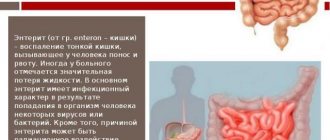Nausea can occur not only due to disturbances in the gastrointestinal tract, but also due to the presence of progressive dangerous diseases inside the body, for example, cancer or dysfunction of the cardiovascular system.
To give the doctor a complete picture of the patient’s state of health, before visiting a specialist, it is recommended that during the day he observe at what time of day and under what external circumstances he experiences such discomfort.
Nausea is a painful sensation in the epigastric region and/or throat, which often leads to vomiting.
Nausea is considered a symptom, not a disease, because it does not arise by itself, but indicates some deviations in the normal functionality of the body.
The feeling of nausea is associated with decreased functional activity of the stomach and changes in the motor function of the duodenum and small intestine.
Severe nausea accompanying vomiting is often a sign of changes in the activity of the autonomic nervous system. In addition to vomiting, nausea is often accompanied by general weakness and a change in skin color to pale tones.
ICD-9: 787.0 ICD-10: R11
It is probably impossible to find a person who is not familiar with such a condition as nausea. Moreover, the causes of nausea are not always obvious at first glance. It is rare that this condition quickly goes away on its own, and it is completely unpleasant when nausea haunts a person constantly.
We will talk to you about what factors cause nausea, its causes (except pregnancy, among other things), and how to get rid of it.
If nausea constantly haunts you, the reasons for this most often lie in diseases of the digestive system, although, of course, there are cases of neurological disorders, disorders of the endocrine system and heart function, in which a feeling of nausea appears along with other symptoms.
Nausea - causes
As you know, you can get rid of any symptom if you influence the cause of its occurrence. Nausea is no exception.
- Ulcer and gastritis
If you experience nausea after eating, the reasons for this lie precisely in these inflammatory processes. Along with nausea, there will be the following symptoms: heaviness in the stomach, a feeling of fullness after eating. On an empty stomach, you may feel a burning sensation in the stomach area.
A specialist will help you determine the diagnosis by conducting a series of studies. And you should also forget about spicy, smoked and fatty foods for now and switch to a dietary diet.
- Problems with the gallbladder
In this case, nausea appears during the process of eating, along with a feeling of fullness from the inside. Associated symptoms: metallic taste in the mouth or bitterness, gas formation, pain in the right hypochondrium, heartburn.
- Symptom of poisoning or intestinal infection
After some time has passed after eating, a person begins to experience nausea, which results in vomiting. Pain is noticeably felt in the navel area, dizziness, weakness appear, and the temperature may rise to 37-38°. In this condition, it is imperative to take measures, because diarrhea and dehydration will be added to it.
First, drink a couple of glasses of warm water in small sips; you need to induce vomiting. Then your task is to replenish the missing fluid: drink water, fruit drinks, weak teas. Two to four tablets of activated carbon will also help you. If you cannot get rid of vomiting and bile is found in it, dizziness begins - this may indicate that a serious infection has entered the body (salmonellosis, for example), in this case it is worth calling an ambulance.
- Inflammatory processes in the kidneys
This cause of nausea is not related to food intake. In some cases, nausea can result in vomiting. An important symptom that indicates that the cause of this nausea is inflammation in the kidneys is lower back pain and problems with urination.
- Pancreatitis is an inflammatory disease of the pancreas
In people suffering from this problem, nausea and bloating appear after eating, accompanied by pain in the right hypochondrium and the appearance of bitterness in the mouth.
- Hypertension
With this disease, constant nausea is possible, which most often appears in the morning. Then in the morning, a person with hypertension may experience swelling and redness of the face, increased fatigue, and often dizziness.
- Taking certain medications
If you read the instructions for the medications you purchase, you will note that many of them can cause nausea as a side effect. Such medications include antibiotics, anti-influenza and anti-inflammatory drugs, iron-containing drugs, some vitamin complexes, etc.
- Concussion
If you seriously hurt your head and feel dizzy and persistently nauseous all the time, consult a doctor immediately.
- Symptom of appendicitis
Regardless of food, nausea may occur in patients with appendicitis; in some cases, nausea will progress to vomiting. The pain will first appear in the upper abdomen, then it will gradually move to the lower right part. An increase in temperature to 37-38° is another symptom of appendicitis.
- Problems with the vestibular system
Severe dizziness and nausea are frequent accompaniments of a sudden change in body position when you roll over or get out of bed. Other signs include the appearance of tinnitus, problems with balance, “spots” in front of the eyes, and the inability to focus for a long time on a moving object.
- Symptom of heart attack and heart failure
With these problems, even after vomiting, nausea remains, accompanied by pain in the upper abdomen. In heart failure, the following symptoms are also common: pale skin, hiccups, and a feeling of suffocation.
- Migraine
Slight dizziness may be added to nausea. If you have nausea due to headaches, you can be “saved” by a quiet, dark room and taking a drug prescribed by a neurologist.
- Stress
Many have noticed how, with strong excitement and emotional arousal, they begin to feel nauseous. Once you calm down, breathe deeply, the adrenaline in the body decreases and the nausea goes away.
- One of the symptoms of meningitis
Nausea is accompanied by a high temperature - from 38°C, photophobia, and a feeling of constriction in the occipital region.
- Hypothyroidism – problems with the thyroid gland
Nausea may accompany you constantly, although not clearly expressed. There may be no appetite, but weight is still gained, a constant feeling of drowsiness, fatigue, cold in hot weather, and in some cases anemia is possible.
- Pregnancy
Read also 5 natural methods for treating gastroesophageal reflux disease
Although there is an opinion that nausea is a frequent companion of almost all pregnant women, especially in the first trimester, this is not so. Not all pregnant women suffer from bouts of nausea. But if you're unlucky with this, there is consolation that by 12-13 weeks the nausea will leave you alone.
- Tumors
Long-lasting nausea and vomiting are a characteristic symptom of a malignant tumor. Not only a tumor, but also a blockage, an inflammatory process in the gastrointestinal tract can cause an attack of nausea.
- Eating sweet foods on an empty stomach can also trigger nausea. In this case, eat a piece of some unsweetened fruit.
- Hunger
Although nausea is usually caused by a lack of appetite, hunger can also cause nausea due to a sharp drop in blood sugar levels.
- Parasitic infestations
Many people do not want to admit that they are present in their bodies, but one of the symptoms of the presence of worms in the body in adults and children are certain types of parasites.
In addition to describing the causes of nausea, there is also a division into types:
Types of Nausea
“Cerebral nausea” , the cause is brain disorders (atherosclerosis, hypertension, brain tumor). In almost all cases it is accompanied by an increase in intracranial and blood pressure.
“Toxic nausea” - due to poisoning with food or endogenous poisons.
“Metabolic nausea” is a consequence of an unbalanced diet, starvation diets, hypovitaminosis, diabetes, and metabolic disorders.
“Vestibular nausea” - as a manifestation of neuroses. This type of nausea is often characteristic of women during pregnancy and menopause.
“Reflex nausea” is a consequence of active irritation of receptors, as well as inflammatory processes in the gastrointestinal tract.
Appears regularly after eating in general or consuming certain foods.
Why does my stomach, stomach, and nausea constantly hurt?
Constant pain in the abdomen, stomach and nausea.
Unpleasant symptoms such as pain in the abdomen, stomach, accompanied by nausea, can mean a number of problems. The most common causes of their occurrence are diseases such as:
- Gastritis
- Pathology of the biliary tract
- Liver and kidney disease
- Pancreatitis
- Oncological diseases
It is important to mention that acute pain in the abdominal area, combined with nausea, may be a consequence of an acute attack of appendicitis. To exclude this possibility, you should immediately seek medical help. If this is not done, the consequences can be very serious. Therefore, you should not expect the situation to resolve itself. It could cost lives.
Symptoms of nausea
The main symptom of nausea, as already mentioned at the beginning of the article, is an unpleasant and sometimes painful feeling that spreads from the epigastric region, through the esophagus to the upper part of the pharynx, accompanied by the desire to “throw up.”
Nausea may be accompanied by:
- vomiting;
- diarrhea;
- general weakness;
- increased sweating;
- pale skin;
- increased salivation;
- cooling the extremities;
- changes in blood pressure;
- darkening of the eyes;
- dizziness;
- elevated temperature;
- chills;
- drowsiness;
- weight loss;
- feeling of lack of air;
- rapid breathing and pulse.
With diarrhea
Nausea and weakness are characteristic symptoms of intestinal problems. Intestinal upset, a sign of which is diarrhea, can signal painful conditions in the body.
They are as follows:
- Food poisoning. Poisoning makes itself felt by the appearance of nausea and weakness, indigestion, often in combination with elevated temperature. If there are symptoms of poisoning, the first thing you need to do is take an adsorbent (activated carbon, or Atoxil) and take measures to prevent dehydration (drink more). In case of poisoning, it is necessary to induce a gag reflex by pressing on the root of the tongue or touching the upper palate at the base of the larynx. This will lead to relief of the condition and a decrease in the severity of symptoms of intoxication.
Nausea and weakness are signs of food poisoning. - Intestinal infection. If an intestinal infection is present, a violent reaction of the body will manifest itself immediately. Fever, weakness, nausea, vomiting, diarrhea are symptoms that almost always accompany this pathology. The main efforts in the treatment of such diseases should be aimed at combating dehydration, since intestinal upset and vomiting quickly reduce fluid reserves in the body. The drug "Regidron" helps restore water balance. The salts included in this inexpensive product help the fluid stay in the body longer. For intestinal infections, you need to drink it often, but little by little, so as not to provoke vomiting.
Types of nausea
There are several types of nausea:
- Toxic. Caused by poisoning with various poisons, food products, endogenous toxins, etc.
- Reflex. Nausea is associated with excessive irritation of receptors located in the vagus nerve and inflammation of the gastrointestinal mucosa. Almost always appears after eating or only certain foods.
- “Brain”. The underlying cause is brain disease. Almost always associated with increased blood and intracranial pressure. In this case, the reason lies in a brain tumor, atherosclerosis, diencephalic crisis, hypertension.
- Vestibular. Associated with various neuroses. Pregnant women and women during menopause are susceptible to it.
- Metabolic. Caused by unbalanced nutrition, fasting, diabetes, hypovitaminosis, metabolic disorders.
Taste of iron in the mouth
This symptom, along with nausea, occurs when:
- lack of microelements (this is especially typical for pregnant women);
- low hemoglobin;
- liver dysfunction;
- diseases of the biliary tract;
- diabetes mellitus;
- chemical poisoning. With severe intoxication, disturbances of consciousness, hallucinations, and delusions are possible.
Symptoms such as nausea and weakness are common signs of a variety of diseases, but with timely consultation with a specialist, you can determine what exactly they are a sign of. This will help to take measures to eliminate the symptoms themselves, and, if necessary, eliminate the cause of their occurrence.
Article design: Oleg Lozinsky
Causes of nausea
To effectively treat nausea, it is necessary to find its cause, and there are many causes of nausea, but the most popular ones are poisoning, illness, motion sickness and pregnancy.
Let's take a closer look at what causes nausea attacks.
Common Causes of Nausea
Poisoning. In case of poisoning, nausea sets in slowly, 2-3 hours after eating, and often ends with vomiting. At the same time, body temperature rises to 38°C. After vomiting, diarrhea usually appears.
Concussion. After a severe head injury, dizziness and nausea may occur. In this case, you must immediately consult a doctor.
Pregnancy. Morning sickness in women can be one of the first signs of pregnancy, because... this is one of the first signs of toxicosis in pregnant women (preeclampsia). Usually this symptom stops by the end of the first trimester of pregnancy, after which it can appear very rarely, and not in such an acute form as at the beginning of the “interesting situation”.
Period. Nausea during menstruation occurs due to hormonal imbalances in a woman’s body, but most often it “gets” during the period between menstruation and ovulation. In addition, the cause of nausea during menstruation can be an increased water content in the body. Be that as it may, it is reliably known that during menstruation in women there is a change in intracranial pressure. Therefore, in addition to nausea, dizziness, excessive anxiety, pale skin, and in severe cases even loss of consciousness become common during this period.
Medications. For a very large number of medications, when taken, nausea is one of the main side symptoms, especially with antibiotics, anti-influenza drugs and, oddly enough, with vitamins.
Vestibular apparatus. Attacks of nausea and dizziness can occur due to a sudden change in body position, for example, from a squatting position to a standing position. In this case, balance is lost, “floating spots” may appear before the eyes, tinnitus may occur, and even “stuffed ears” may occur.
Diets. In part, nausea is a frequent companion of a person following various diets. The fact is that this happens when the menu is incorrectly selected, because various micro- and macroelements included in certain products, in incorrect proportions, can disrupt metabolism, especially in the digestive organs.
Heat and sunstroke.
Motion sickness.
Diseases that may be accompanied by attacks of nausea
Gastritis, peptic ulcer. With these diseases, nausea occurs after eating, and is often accompanied by heartburn, unpleasant heaviness in the abdomen and burning sensation.
Appendicitis. With appendicitis, pain appears in the upper abdomen, which a little later moves to the right half, after which a feeling of nausea may appear within an hour. At the same time, body temperature rises to 37°C-38°C, sometimes higher.
Meningitis. Nausea with meningitis is accompanied by an increase in body temperature, up to 38°C or more, pressure in the back of the head, and photophobia.
Migraine. Migraine is accompanied by constant headache, slight dizziness and nausea.
Hypothyroidism. Symptoms of hypothyroidism: constant fatigue and drowsiness, lack of appetite, constant weight gain, sometimes anemia, constant mild nausea, a feeling of chilliness, puffiness of the face and swelling of the limbs, constipation.
Gallbladder disease. With this disease, nausea occurs due to distension of the stomach, bloating and gases, the appearance of a bitter taste in the mouth and pain in the right hypochondrium.
Pancreatitis. Nausea after eating, which is accompanied by bloating, bitterness in the mouth, pain in the right hypochondrium, and sometimes weight loss, may indicate the presence of a disease such as pancreatitis. Hypertension. Symptoms of hypertension are: dizziness, headache, swelling, periodic appearance of red spots on the face and nausea, which is most pronounced in the morning, and in a milder form accompanies a person throughout the day.
Heart failure. In heart failure, the feeling of nausea manifests itself on a constant basis, and almost always ends with vomiting. At the same time, even after bowel movement, the feeling of nausea does not disappear. In addition, the patient's complexion is somewhat green, pain in the upper abdomen periodically appears, and sometimes hiccups and a feeling of lack of air appear.
Read also Disorders and diseases of the endocrine system: list of diseases, causes, symptoms, prevention and methods of their treatment
Stroke. During a stroke, consciousness becomes foggy, dizziness, severe pain in the back of the head and nausea appear. Sometimes paralysis can occur.
Kidney inflammation. With kidney inflammation, the following symptoms are observed: increased body temperature up to 40°C, chills, persistent lumbar pain, as well as abdominal pain, nausea.
Gallstone disease (GSD). Gallstone disease is characterized by pain in the right hypochondrium, accompanied by nausea and vomiting. Treatment is carried out strictly under the supervision of a doctor.
Oncological diseases. Oncological diseases can not only provoke constant nausea during their development, but the treatment of tumors (chemotherapy) is accompanied by such a side effect as nausea.
Seasickness.
In addition to all of the above causes of nausea, there are others that can sometimes be accompanied by many other diseases, so if you experience attacks of nausea, especially on an ongoing basis, be sure to consult a doctor to prevent more serious consequences!
Prevention
It may not be possible to prevent all causes of fatigue and nausea. However, the following factors may reduce a person's risk of developing these symptoms:
- drink water
- Limit your alcohol and caffeine intake and avoid it before bed
- avoid large meals, especially late in the evening
- sufficient sleep
- maintain personal hygiene to prevent infections
- Eat a healthy diet and exercise regularly
- Relieve stress in the following ways:
- meditation
- breathing exercises
- yoga and tai chi
Treatment of nausea
Since nausea is a symptom, its treatment method depends on the cause or underlying disease. If you suspect a disease, it is important not to self-medicate, since nausea may be associated with emergency conditions or the initial manifestation of severe pathology, which require immediate consultation with a doctor and the initiation of specific treatment under medical supervision.
If the cause is not related to the disease, it is necessary to eliminate the harmful factor (sun, smoke, excess food) as quickly as possible.
For seasickness, it is possible to use scopalamine in the form of a skin patch 5-6 hours before the start of the trip.
During pregnancy, rest and rest are recommended; it is possible to use Meclozin orally 25 mg 2 times a day or in suppositories 50 mg.
Sometimes nausea is caused by stress or mental disorders. In this case, courses of psychotherapy may be prescribed.
Forecast
The outlook for people who have fatigue and nausea depends on the underlying cause of these symptoms. Fatigue and nausea are not always a cause for concern. This combination of symptoms sometimes disappears after appropriate lifestyle adjustments, such as changes in eating, sleeping, or exercise.
However, severe, persistent, or recurring episodes of fatigue and nausea may indicate a medical condition that requires treatment. In some cases, a doctor can diagnose and treat the cause.
Medicines for nausea
An anti-nausea drug is prescribed by a doctor based on an individual examination, so taking this or that drug on your own is highly not recommended, especially during pregnancy.
To treat nausea, neuroleptics are almost always used: Aminazine, Etaperazine, prokinetics (Domperidone), benzadiazepines (Diazepam, Lorazepam), phenothiazines.
Sometimes antihistamines are used: Diazolin, Diphenhydramine, Pipolfen, or dopamine receptor blockers: Alizapride, Cerucal, Dimetpramide.
Antiserotin drugs are rarely used.
In addition, for nausea they use: “Motilium”, “Aeron”, “Metacin”, “Platifillin”.
Woman and man constantly feel sick: reviews
A man is constantly vomiting
If you are constantly vomiting, and you don’t know why and what to do about it, then you need to urgently go to the doctor. With such a symptom, you should not put off going to the clinic. Read reviews from other women and men who constantly felt sick:
Maria, 65 years old
I recently had an appointment with a therapist who prescribed new medications to lower my blood pressure. From about the same moment I experienced constant nausea that lasted throughout the day. I tried changing food products, but it didn’t bring any results. Could the cause of illness be due to incorrect dosage or incompatibility of new drugs with others? I'll have to go see the doctor again.
Mikhail, 56 years old
A year ago I was diagnosed with type 2 diabetes. For the last two months, the sugar level was too high, rising to fifteen units. The therapist increased the dose of insulin, this helped - my sugar dropped to normal levels. However, a problem arose: I feel constant nausea. The attacks are especially severe in the morning. The doctor said that I need to constantly monitor my blood sugar or review the menu. Perhaps those foods that increase sugar and cause nausea.
Victoria, 25 years old
In order to lose weight (an extra 7 kg), I switched to proper nutrition, completely reviewing my diet. In addition, I signed up for the gym and go three times a week. There is a problem: I have been suffering from constant nausea for two weeks now. I tried to slightly modify my diet, but it did not bring the expected result. The possibility of pregnancy is completely excluded. My sports doctor said it was due to heavy physical activity. We reviewed all the exercises, now it has become easier.
Treatment of nausea with folk remedies
To get rid of nausea at home, you can use the following folk remedies:
— At the first signs of nausea, inhale ammonia , and also dissolve a Validol tablet or mint candy.
- Lemon and soda. Mix the juice from half a lemon with half a teaspoon of soda. Take the medicine after the first signs of nausea.
- During pregnancy. If you have nausea and vomiting, you should eat food more often, but in smaller proportions. In the morning, drink only water with lemon or slightly sweetened juice, maybe with breadcrumbs.
- Green tea. An excellent remedy for nausea is a cup of strong green tea, without sugar, or with lemon.
- Ginger. Add grated ginger root to your dishes. In addition, for nausea, a slice of ginger can be placed under the tongue and dissolved until the symptom completely stops, after which the ginger can be removed.
- Potato juice. For constant attacks, drink 0.25-0.5 tablespoons of fresh potato juice before meals.
- Dill. In case of poisoning and stomach upsets, take a drink: 1 teaspoon of dill seeds brewed in 200 ml of boiling water.
- Nettle with milk. Brew 1 teaspoon of nettle in 200 ml of boiling milk. Boil the product for 5 minutes over low heat. Take the third part of the decoction immediately after preparation, then take 1 tablespoon every 2-3 hours until the feeling of nausea completely disappears.
— Melissa. Pour 4 teaspoons of dry lemon balm into 200 ml of boiling water. Let the product sit for several hours. Take 100 ml before meals 4 times a day.
- Mint. 1 tbsp. pour a spoonful of peppermint into 200 ml. boiling water Let the product sit for 2 hours. Take 1 tbsp. spoon 3 times a day.
Also, for nausea, you can take 15 drops of mint tincture dissolved in water.
- Watch. Pour 2 teaspoons of three-leaf watch into 400 ml of cold water. Let the product sit for 8 hours. Use throughout the day. This remedy is used not only for nausea, but also to stimulate digestion.
— Tangerine tincture. Pour the crushed peel of 3-4 tangerines with 250 grams of vodka. Let the product brew for 7 days. Take tangerine tincture 20 drops 4 times a day.
- Carnation. Grind the spice to a powder. Take 1 teaspoon 3 times a day with a glass of cold water.
- Potassium permanganate. If nausea is caused by food poisoning and there is no vomiting, the patient can be given a weak solution of potassium permanganate, thus inducing vomiting.
If attacks of nausea are constant and incessant, you should consult a doctor who will find out the root causes of nausea and, with complex treatment, will definitely get rid of this rather unpleasant phenomenon.
How to prevent night sickness
To prevent night sickness, the first thing you should do is adjust your diet, eat foods that are well digestible, eat small portions and don’t overeat before bed. It is better to eat more protein and fresh foods, it prevents nausea.
You must remember to drink, drink at least 2 liters. per day, preferably water or herbal tea without sugar. Mint or ginger tea has a good effect.
An active lifestyle and walks in the fresh air before bedtime strengthen the body well.
If you take a warm bath in the evening, your body will relax and this will help relieve nausea.
Some people find that aromatherapy with mint or lavender essential oil, which is best applied to the wrist, helps.
Causes of nausea in children
Many parents mistakenly believe that their child cannot yet have health problems, because they experience nausea and vomiting only due to food poisoning. However, this is not the case.
- Children may have increased intracranial pressure. Then nausea appears in the morning along with a headache.
- Vestibular apparatus - if there are problems with it, children experience nausea in transport. You should not feed such a child before the trip; sit him closer to the driver, ask him to look straight ahead and let him drink water from time to time.
- Stress. Children often feel sick if they are very scared, offended or feel guilty - this is how they try to isolate themselves from troubles. Breathing exercises or a simple paper bag can help here.
- Allergic reaction. Nausea - as a result of intolerance to any product. An allergist will help you determine which one.
- Excessive absorption of food. Nausea from overeating occurs frequently in children. If the child does not want to finish eating, then forget about the “clean plate society.” You will force him to finish eating, you will feel pride from satisfying your parental will, and then the child will feel sick...
- Dehydration. Children often, after playing and sweating, may feel an attack of nausea; immediately give them a drink of plain water, this will help relieve the attack.
Reasons why you constantly feel sick and want to eat
Constantly feeling nauseous and hungry
If nausea is accompanied by a constant desire to eat, then this may be a symptom not only of the disease that has arisen, but also of a number of other unpleasant conditions, including:
- Exhausting physical and mental stress
- Depression
- Problems with excess weight
- Poor nutrition
- Long-term stress
- Chronic lack of sleep
If we are talking about diseases, then nausea in combination with constant hunger can be a consequence of the development of diabetes, cholecystitis, and parasitic diseases. In addition to the diseases listed above, the combination of these symptoms is characteristic of bulimia. With this psychoemotional disorder, the patient experiences very strong hunger, which inevitably ends in bouts of compulsive overeating.
How to get rid of nausea using folk remedies
If nausea is a rare occurrence for you, try to get rid of it on your own.
Read also Hemorrhoids - description, types, causes, prevention and treatment of hemorrhoids
The most common method is ammonia. A few drops should be placed on a cotton pad and brought 5 cm to the nose. A mint candy or a Validol tablet under the tongue will help get rid of the unpleasant condition.
Nettle decoction for nausea
Pour 1 teaspoon of nettle into a cup of milk, boil, reduce heat to low and simmer for five minutes. Filter through a strainer, drink 1/3 of the broth at once, then take a tablespoon every 2 hours until the nausea passes.
Herbal collection for nausea
Mix 2 tsp. chamomile, 1 tsp. sage and rosemary. Pour ½ liter of boiling water over the collection and leave for 20 minutes. Strain and take 1-3 sips every 15 minutes.
Ginger root decoction
Grate a small piece of the root, pour a cup of boiling water over it, let it brew and drink it in small sips.
Mint for nausea
- Place 5 drops of mint tincture into a cup of water and drink.
- 1 tbsp. l. pour a cup of boiling water over mint leaves, let it boil and remove from heat. Cover with a lid and let cool. Strain and take 1 tbsp. l. every 2-3 hours.
Lemon juice diluted with water, inhaling cloves, and a glass of water with a teaspoon of soda will also help with nausea.
There are many ways and many of them are quite effective. However, if nausea occurs frequently, you should definitely go to a doctor who will help determine the cause and get rid of it.
With temperature
Nausea and weakness, signs of which should alert a person, in combination with high fever are a serious cause for concern. Most often, this condition indicates the presence of an inflammatory process or severe intoxication in the body.
These symptoms accompany:
- ARI or ARVI. Colds caused by viruses or bacteria are often accompanied by nausea and fever, which is a consequence of intoxication of the body. To alleviate the condition, you should drink plenty of fluids, and Paracetamol or Nurofen will help reduce the temperature.
- Flu. The influenza virus causes severe intoxication of the body, which is expressed in a rise in temperature to high levels, nausea, dizziness and headache, and aching joints. The main conditions for a speedy recovery are compliance with bed rest. Having the flu on your feet is fraught with serious complications. To alleviate the condition, antipyretic drugs are taken. Drinking plenty of fluids also helps to cope with the disease faster.
- Kidney diseases. Pyelonephritis can provoke a rise in temperature up to 40 degrees; with this disease, signs of intoxication such as chills, weakness, and loss of appetite are observed. If there are such symptoms, the nephrologist will direct the patient to undergo the necessary tests to clarify the diagnosis, and, if confirmed, will prescribe a course of antibiotics to combat the causative agent of the infection.
What do morning sickness attacks mean?
A person feels nauseous during the day (the reasons may relate to the functioning of various body systems), possibly due to fatigue accumulated during the waking period. Often this condition does not cause concern in people who spend a large amount of time in closed office spaces.
IT IS MUCH UNUSUALLY FOR THEM TO EXPERIENCE NAUSEA IN THE MORNING AFTER WAKING UP.
In this case, this condition is usually associated with:
- disturbances in the functioning of biorhythms resulting from lack of sufficient deep sleep or waking up too early;
- low blood sugar;
- overeating on the eve of going to bed at night;
- acute feelings of anxiety or stress experienced the day before;
- large amounts of alcohol consumed before bed.
Why do I constantly feel sick and weak?
Constant nausea and weakness
Nausea, combined with a constant feeling of weakness, may indicate the occurrence and development of the disease. Disturbances in the body may be as follows:
- Problems in the endocrine system
- Function of the hematopoietic organs
- Problems with the cardiovascular system
- Complications in the digestive system
- Diseases of the genitourinary system
If a person has been examined and none of the listed diseases have been identified, then it makes sense to reconsider his lifestyle. The following factors can cause such ailments:
- Not getting enough sleep
- Poor nutrition
- Passive lifestyle
- Having bad habits - smoking, excessive alcohol consumption, etc.
In addition, a person can be healthy, but experience a deficiency of some nutrients and microelements. You should pay attention to your own diet and supplement it with healthy foods.
Why do you feel bad after eating?
Nausea that occurs after eating can occur due to:
- inclusion in the diet of a large volume of difficult-to-digest foods that slow down the digestion process;
- taking a number of medications (side effects);
- excessive food consumption;
- insufficient food intake;
- eating foods on an empty stomach that irritate the gastrointestinal tract (sweets, citrus fruits, coffee);
- the onset of pregnancy;
- improper functioning of the stomach (incipient pathology).
Diagnostics
After the initial examination, the therapist will either redirect the patient to a specialist or recommend that he undergo a number of instrumental and laboratory procedures, including:
- Donating blood for general and biochemical analysis.
- Donating blood to determine its glucose level.
- Performing an ECG to evaluate the functioning of the heart muscle.
- Passing audiography.
- Performing a CT or MRI.
- X-ray of the skull.
- Ultrasound Doppler. This study allows you to assess the condition of the vessels supplying the brain.
This examination scheme is standard for patients with complaints of dizziness, headaches and nausea. If using the above methods it is not possible to make a correct diagnosis, then additional examinations are required to clarify the diagnosis.
What makes you feel nauseous in the evening and at night?
A person begins to experience nausea in the evening and at night when:
- constant overeating not only during the day, but also before going to bed;
- constantly being in a state of nervous tension;
- the presence of diseases of the digestive system;
- progressive liver and gallbladder dysfunction;
- disorders of the pancreas;
- mental disorders;
- malfunctions of the central nervous system.
If there are repeated episodes of nausea in the evening, a person is advised to first of all reconsider his eating behavior and only in the absence of the necessary changes to look for the cause in dysfunctions of the vital systems of the body.
Why do you always feel nauseous and want to sleep?
Constantly feeling nauseous and want to sleep
If a feeling of drowsiness is added to constant nausea, a person suffers from a loss of strength, then this may be due to the following reasons:
- Hormonal disbalance
- Oxygen starvation of brain tissue
- Chemical poisoning
- Problems in the cardiovascular system
- Side effects of medications (especially if they are not combined with each other)
The question of why you constantly feel sick and want to sleep can only be answered by a doctor after diagnostics and tests.
What to do if you have nausea without vomiting?
A person’s condition with frequent attacks of nausea without subsequent vomiting can be alleviated by either a radical change in one’s lifestyle or simple manipulations that do not require special skills and devices.
Regardless of the chosen method of “self-medication,” consulting a doctor is a mandatory step that even a person who is confident in the stability of his immunity and the body as a whole must go through.
Review your diet
The easiest way to get rid of nausea while awake is to adjust your eating behavior.
Nutritionists recommend:
- give up heavy foods, sweets, flour products and those that contain a large amount of dyes;
- eat no more than 3-4 times a day, while controlling the size of portions consumed (no more than 150 g);
- when an attack suddenly begins, eat a slice of lemon or persimmon, which has a beneficial effect on the gastrointestinal tract of a healthy person;
- suck on a piece of ice, holding the tasteless piece of ice in your mouth for as long as possible.
Change the scenery
Nausea can begin when a person is in unfavorable conditions for the body for a long time.
To get rid of discomfort, you can:
- go outside (relevant for people who spend their working hours in an office space where there are no conditions for normal fresh air circulation);
- get away from the crowd (especially effective if nausea is associated with a person’s psychological state, in particular with an incipient panic attack);
- move to a place with a minimum amount of foreign odors (at least until the symptoms of nausea decrease).
Induce vomiting
You should induce vomiting only if you are sure that the cause of nausea is intoxication of the body (with vomiting, most of the harmful substances will leave the gastrointestinal tract). Otherwise, you can provoke dehydration , which negatively affects the general condition of a person.
To induce vomiting, it is recommended to use a spoon or clean fingers to press on the root of the tongue. It is extremely undesirable to repeat artificial gastric emptying within 1 day, regardless of the amount of time between manipulations.
Take medicine
Taking medications to suppress an attack of nausea is permitted only after consultation with a therapist or specialist who has an understanding of the health status of a particular person.
Doctors, depending on the root cause, may prescribe the following to normalize the condition:
| Name of a popular drug | The main purpose of his appointment |
| Validol | sedative vasodilator |
| Avia-More | prescribed for nausea caused by motion sickness in transport |
| Filtimum | effective against food intoxication |
| Motilium | improves well-being in case of poisoning and gastrointestinal disorders |
Get tested
At the first unfounded attack of nausea during the day, a person needs to see a general practitioner as soon as possible. The general practitioner, having prescribed the necessary tests, will decide on further treatment of the patient. He will either independently write out a regimen for taking the appropriate medications or recommend that the patient see a specialist.
A standard set of procedures for the formation of the general condition of the human body includes:
- general blood analysis;
- general urine analysis;
- ultrasound examinations, MRI or x-rays (if there are complaints of pain in specific areas of the body or organs).
DURING THE DAY THE BODY GET TIRED AND IS EXPOSED TO EXTERNAL CIRCUMSTANCES, OFTEN HAVING A NEGATIVE INFLUENCE ON THE GENERAL CONDITION OF THE PERSON.
Very often this is what causes nausea during wakefulness. Despite the fact that the described sensation may be a simple consequence of fatigue, ignoring it is not only undesirable, but can even be dangerous to the life and health of both adults and children.
What to do if you constantly feel sick?
Constantly feeling nauseous
The feeling of nausea is always unpleasant. At this time, a person may feel an unpleasant taste in the mouth, a desire to vomit, and dizziness. What to do if you constantly feel sick? If an attack of this unpleasant condition occurs, you can cope with it by following these simple tips:
Don't lie down:
- In a horizontal position, it will be much easier for gastric juice to rise up the esophagus, which will only aggravate the feeling of discomfort.
- The correct solution would be to take a sitting position.
You should open the window and ventilate:
- Fresh air can significantly improve your condition.
- In addition, if the cause of nausea is an unpleasant odor, then this method will help correct the situation.
Make a compress:
- This will help reduce the high temperature, which means the person will feel better.
Try breathing deeply:
- This technique is especially effective if nausea is caused by stress.
- This breathing will help you calm down and relieve tension.
Avoid heavy foods:
- This includes: fatty and fried foods, foods with a high percentage of carbohydrates.
- First of all, this rule applies to carbonated and sweet drinks - it is better to avoid them.
Try to drink more fluids:
- Water helps cleanse our body of toxins.
- Consuming it regularly in small portions will help you avoid dehydration.
Often, when intoxication begins, a person loses a lot of fluid. This is bad for the whole body. In this case, it is difficult to drink, since water causes a feeling of vomiting. You need to try to feed the sick person in small portions. Even a teaspoon of water will bring invaluable benefits to the body.











